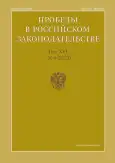Новые средства технико-криминалистического обеспечения борьбы с преступностью
- Авторы: Берова Д.М.1, Гаужаева В.А.1
-
Учреждения:
- Краснодарский университет МВД России
- Выпуск: Том 16, № 6 (2023)
- Страницы: 167-170
- Раздел: Уголовно-правовые науки
- URL: https://bakhtiniada.ru/2072-3164/article/view/232150
- EDN: https://elibrary.ru/VYIEAL
- ID: 232150
Цитировать
Аннотация
Целью написания статьи является обобщение данных о некоторых новых методах технико-криминалистического обеспечения в свете распространения групп преступлений и технологий нового типа. В работе приводится обобщенная характеристика кибепреступности и технико-криминалистических средств нового поколения, которые составляют технико-криминалистическое обеспечение первоначального этапа расследования.
Выводами выступает сам перечень новых технико-криминалистических средств с рекомендациями по их применению к которым относятся: форензика (совокупность методов раскрытия преступлений, связанных с компьютерной информацией, исследования цифровых доказательств, поиска, получения и закрепления таких доказательств), методы связанные с искусственным интеллектом, использование в расследовании беспилотных летательных аппаратов, биометрических данных, трехмерной печати. Нам представляется, что первый из обозначенных методов требует отдельного исследования.
Результаты такого обобщения могут быть использованы в практической деятельности органов предварительного расследования, для дальнейших теоретических исследований, подготовки научных работ и для решения практических задач в области подготовки и проведения расследования уголовных дел на первоначальном этапе.
Ключевые слова
Полный текст
Открыть статью на сайте журналаОб авторах
Джульетта Михайловна Берова
Краснодарский университет МВД России
Автор, ответственный за переписку.
Email: berova-d@yandex.ru
SPIN-код: 1908-7973
доктор юрид. наук, доцент, Северо-Кавказский институт повышения квалификации (филиал)
Россия, НальчикВиктория Александровна Гаужаева
Краснодарский университет МВД России
Email: kristyv_13@mail.ru
SPIN-код: 9135-1670
кандидат юрид. наук, доцент кафедры специально-технической подготовки, Северо-Кавказский институт повышения квалификации (филиал)
Россия, НальчикСписок литературы
- Аккаева Х.А. Проблемы использования современных биометрических технологий в информационно-поисковых системах регистрации граждан // Исторические, философские, политические и юридические науки, культурология и искусствоведение. Вопросы теории и практики. 2014. № 4-1 (42). С. 13-16.
- Воздушный кодекс Российской Федерации: Федеральный закон от 19.03.1997 №60-ФЗ (ред. от 13.06.2023) [Электронный ресурс] // https://www.consultant.ru/cons/cgi/online.cgi?req=doc&base=LAW&n=449657&dst=100001#0Cf8wiTSDbwfgQi4 (дата обращения: 03.07.2023).
- Гаужаева В.А., Иноземцев С.В. Применение беспилотных летательных аппаратов при проведении первоначальных следственных действий и оперативно-розыскных мероприятий // Право и управление. 2023. № 2. С. 117-120.
- Гаужаева В.А., Лифанова Л.Г. Биометрическая идентификация в криминалистике // Аграрное и земельное право. 2023. № 3 (219). С. 151-154.
- Долженко Н.И., Ярощук И.А. Киберпреступность как одна из ключевых проблем современности // Правовая парадигма. 2020. Т. 19. № 1. С.151-157.
- Думнов С. Н. К вопросу применения метода лазерного 3D-сканирования при производстве судебной автотехнической экспертизы // Криминалистика. Судебно-экспертная деятельность. Оперативно-розыскная деятельность. 2019. №3 (90) [Электронный ресурс] // https://cyberleninka.ru/article/n/k-voprosu-primeneniya-metoda-lazernogo-3d-skanirovaniya-pri-proizvodstve-sudebnoi-avtotehnicheskoi-ekspertizy/viewer (дата обращения: 03.07.2023).
- Мордвинов К.В., Удавихина У.А. Киберпреступность в России: актуальные вызовы и успешные практики борьбы с киберпреступностью // Теоретическая и прикладная юриспруденция. 2022. № 1 (11). С. 83-88.
- Тимошенко Е.А. Компьютерная форензика и её роль в процессе раскрытия и расследования преступлений в условиях глобальной цифровизации // Вестник студенческого научного общества ГОУ ВПО «Донецкий национальный университет». 2022. Т. 4. № 14-2. С. 178-182.
- Федосеев А.Э., Архипцев И.Н. Форензика как компонент противодействия высокотехнологичной преступности // Вестник Белгородского юридического института МВД России имени И.Д. Путилина. 2023. № 1. С. 63-69.
Дополнительные файлы








